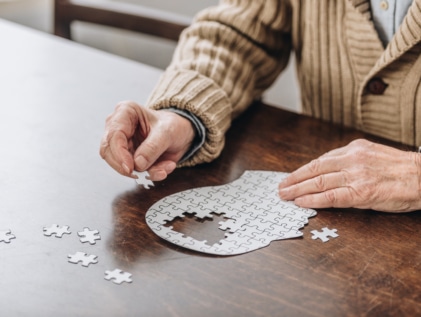Diagnosis of a disease such as Alzheimer’s is life altering. Yet some seniors living with Alzheimer’s disease who show signs of denial after diagnosis may, in actuality, not understand that anything is wrong. This may be a sign of anosognosia, or lack of insight that impairs one’s ability to understand and perceive their medical condition. Though it is often associated with severe mental health issues, like bipolar disorder and schizophrenia, anosognosia has long been recognized in those living with Alzheimer’s.
Causes of Anosognosia
As we journey through life and the aging process, our perception of self changes. We are continually adjusting our mental image of ourselves based on significant life events and physical changes, like getting married or having children, learning a new skill, developing a new scar, or noticing more wrinkles.
The area of the brain known as the frontal lobe is responsible for remembering and organizing this new information. Alzheimer’s disease, in addition to some mental health conditions, can damage the frontal lobe making it difficult to update one’s perception of their health and self-image.
Anosognosia and Alzheimer’s
Approximately 81% of those living with Alzheimer’s disease have some form of anosognosia, and symptoms may worsen as the disease progresses through its various stages. Anosognosia is not static, meaning that those living with the condition may be well aware of their cognitive impairment one day and then suddenly unaware the next. This can cause a great deal of confusion and frustration for the person living with Alzheimer’s and their caregivers. The person living with Alzheimer’s may conclude that their loved ones are lying to them, causing them to become angry, distant, or aggressive.
If you are caring for someone with Alzheimer’s and anosognosia, experts recommend using the LEAP method to improve communication and trust:
- Listen to your loved one, let them know you hear what they are saying, and validate their feelings by repeating back what they’ve said.
- Empathize and identify with their feelings to validate their thoughts, attitude, and wishes
- Focus on thoughts and ideas that you can both agree on and avoid offering your own opinions on the matter
- Partner with the person to work towards an agreed-upon solution or goal
If you suspect that your loved one may be battling with anosognosia, it is important to consult a doctor. Physicians are specialists are best equipped to differentiate between anosognosia and denial.

